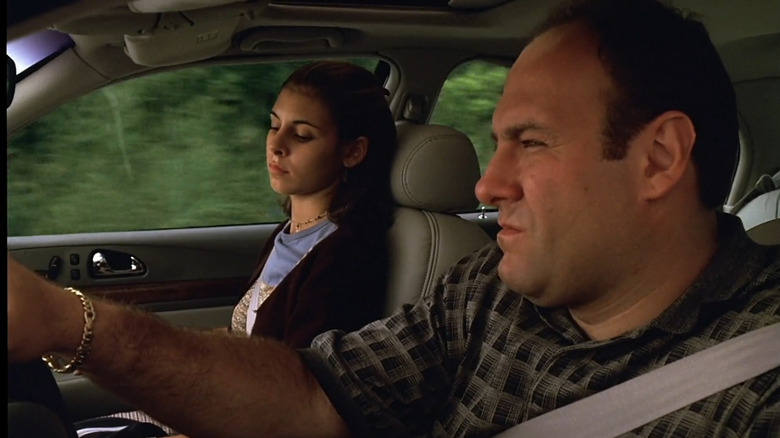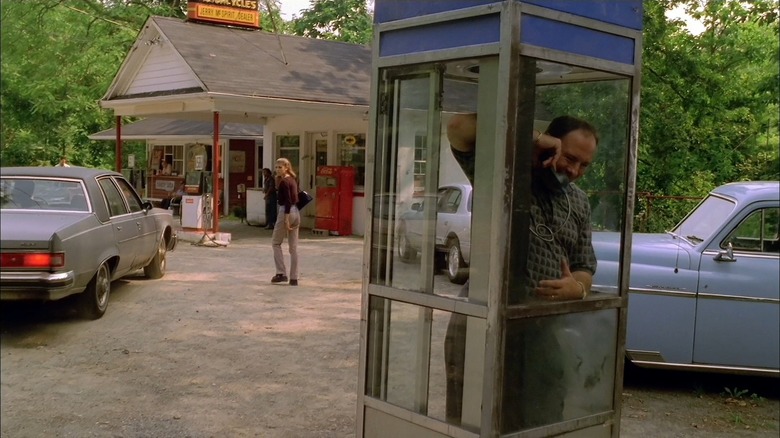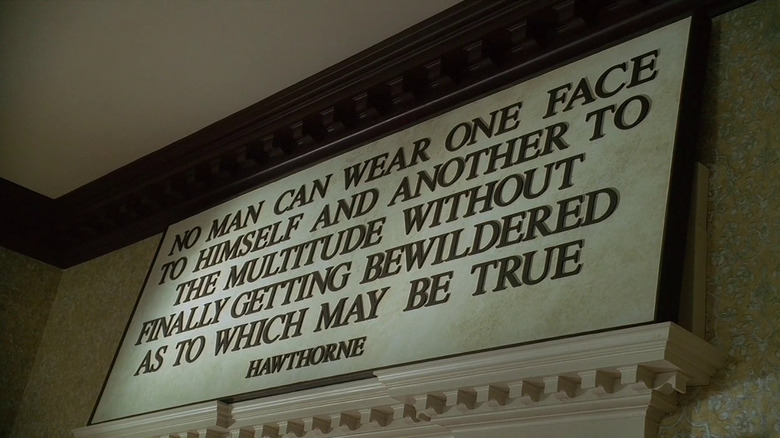One Of The Best Sopranos Episodes Originated With One Line
"The Sopranos" features some incredible episodes. It was more cinematic than a gangster show was expected to be in the '90s and, as /Film's Shae Sennett writes, creator David Chase was aware of its potential as a national phenomenon. It was a television show about a Mafia man, of course, but borne of Chase's experiences in therapy, this mob boss would learn everything about himself and change little — a concept that would eventually dominate the wave of prestige TV to come.
For its six-season run from 1999 to 2007, the HBO crime series mostly stayed in northern New Jersey, where the DiMeo crime family would operate with Tony Soprano (James Gandolfini) at the top. But some of its most celebrated episodes — Christopher goes to Hollywood, Carmela and Rosalie go to Paris — broke free of the show's own boundaries and gave a chance for the traveler-protagonist to add some depth to their character arc. Tony got the same opportunity in the very first season.
Titled "College," episode 5 sees Tony going to tour schools with his daughter. Meadow (Jamie-Lynn Sigler) has a rebellious streak but she's a smart teenager, and Tony is tasked with accompanying her to pastoral Maine to check out potential colleges. It's here that she asks her father point-blank if he is in the Mafia, and Tony's somewhat honest answer endears the pair. Later, Tony strangles an old associate to death and, in a revealing move, lies to Meadow about his whereabouts. Set against the rest of the series, "College" seems like a standalone episode, but it primes the pump for the sort of complex, criminal antiheroes of TV that we'd see later in the likes of Dexter Morgan and Nucky Thompson.
So where did the idea for this episode come from?
Its on sight with Fabian Petrulio
The most comprehensive history of "The Sopranos" comes courtesy of those directly involved in its conception and execution. The bulk of material in "Woke Up This Morning: The Definitive Oral History of the Sopranos" comes from a corresponding podcast show, hosted by "Sopranos" stars Michael Imperioli and Steve Schirripa. But the expansion book contains tons of additional behind-the-scenes insights on the production, including the origin story of "College."
Executive producers Robin Green and Mitchell Burgess spoke about the groundbreaking episode, which began with the writer's room "breaking" the proposed episode down "into its various beats," Imperioli explains, "the scenes that will make up the episode." In comes David Chase, and reportedly, he said, "I can't stand it anymore. I've got to get out of here" — meaning that he had to get Tony out of New Jersey.
Carmela would be left at home, busy with the family's priest in a storyline inspired partially by the 1983 miniseries "The Thorn Birds." Green and Burgess knocked out the beats on the Carmela plot overnight, but the episode needed to do more with Tony. "That is a very amusing conceit," Robin says, "because you have this thug taking his sweet daughter to all these Ivy League institutions in New England. It was just fish out of water." Green recalls the moment that they really started cooking with gas:
"David said, 'Something has to happen.' We were stumped. We all sat around. It took about a minute and a half for Frank Renzulli, who was just a fantastic presence in the room — he was the real marinara, he grew up with these guys in Boston — Frank says, 'Tony sees somebody in the witness protection program.' At that moment, it was, 'Boom.'"
Chase would crank out the story beats within hours.
Good morning, rat
So why is "College" considered one of the greatest television episodes ever? First, it's the first time in "The Sopranos" the audience observes Tony kill someone. One would think that a high body count would come with a show about a caporegime, but the network's jimmies were thoroughly rustled at the thought of such a sympathetic character being so irredeemably wicked. Chase remembers the kill scene being a source of ire from then-president of HBO Chris Albrecht, who called screaming that Chase was ruining "...one of the most dynamic characters of the past 20 years." Thankfully, Chase charged forward.
Coming from an extensive television writing and production background, the Jersey-raised filmmaker cut his teeth on series like "The Rockford Files," but likewise got a sour taste in his mouth from television's creative limits. Brett Martin's book "Difficult Men: Behind the Scenes of a Creative Revolution" quotes "Sopranos" writer Matthew Weiner thusly:
"Do you know how many decisions were based on some meeting when he was on 'Northern Exposure,' or 'Rockford,' or 'Kolchak,' or some other show you've never heard of where he worked for three years and somebody told him, 'You can't do that'?"
And so, a show observing Italian-American mob life took on a defiant air. See the turning point here:
Tony didn't just shoot informant Fabian Petrulio — he got personal with it, using every ounce of his strength to garrote the man as he begs for his life. Afterward, the sight of a flock of birds in flight puts a poetic spin on Tony's failing efforts to hang onto his family's love and trust. Shortly thereafter, he would lie to his daughter once again. Reconciling this necessary aspect of his chosen profession with the family harmony he struggles to maintain becomes a pulse point of the episode and provides the blueprint for many complicated anti-heroes to come.


